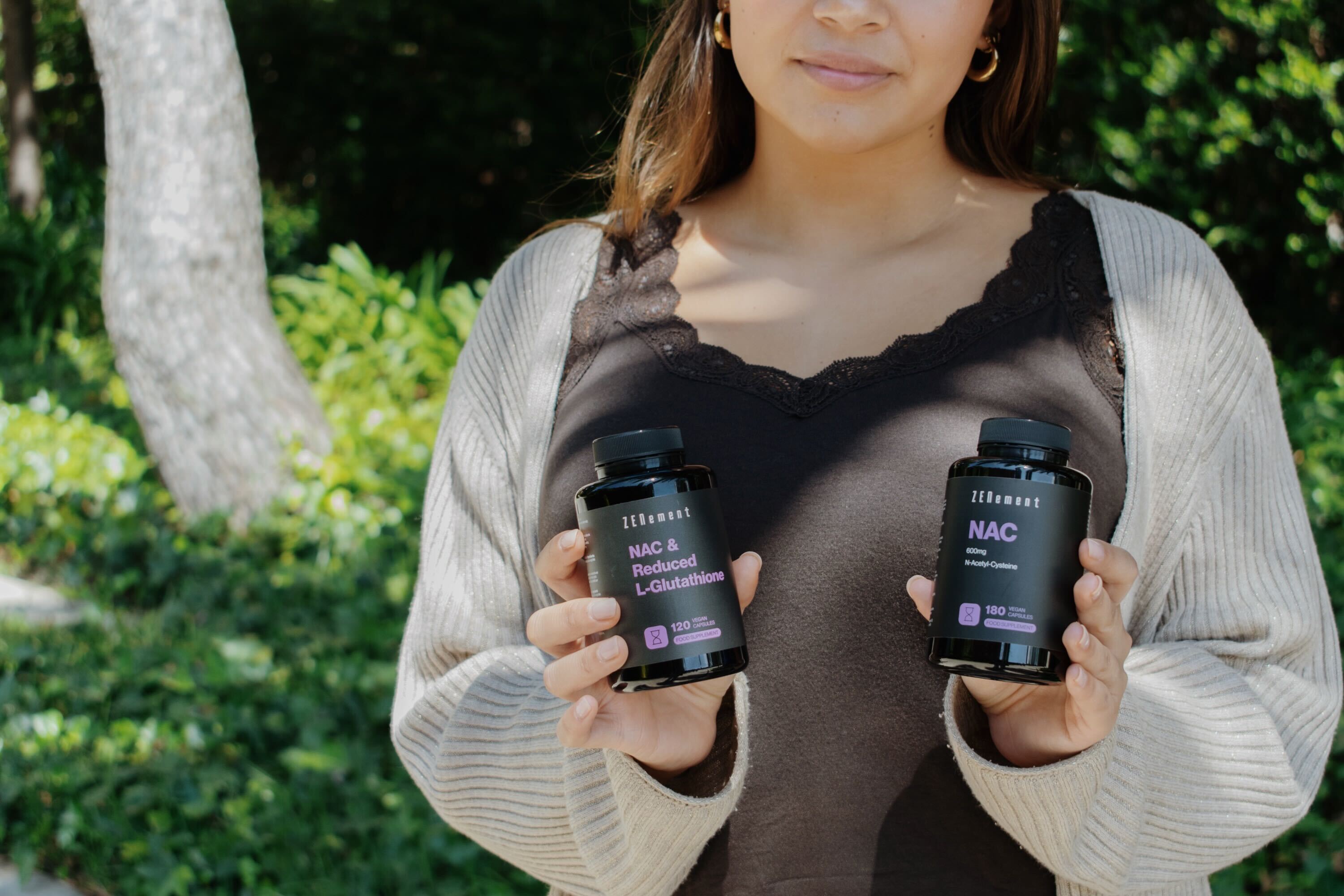Have you ever heard of N-acetylcysteine, also known as ‘NAC’? This compound is becoming increasingly popular in the world of food supplements.
But what exactly is NAC and why should you include it in your supplement routine? In this article, we'll break down everything you need to know about NAC, from what it is to its benefits and who it is recommended for.
What is NAC
L-cysteine is a non-essential amino acid that plays a crucial role in the body's protein synthesis and is one of the essential 'building blocks' of our proteins. N-acetylcysteine, or NAC, is a modified version of L-cysteine. It is designed to improve its chemical stability and bioavailability, the efficiency with which it is absorbed and used by the body.
This modification makes NAC a preferred choice for supplementation, as it can be absorbed more efficiently than L-cysteine when taken as a dietary supplement. In addition to its antioxidant properties that help replenish glutathione levels, NAC is also valued in nutrition and supplementation for its benefits in body homeostasis, improved immune function, and its contribution to protecting against cellular damage [1].
What is the relationship between NAC and Glutathione ?
It is possible that if you have heard of NAC you have also heard of Glutathione, as these two compounds are directly related. Glutathione is a very important antioxidant in our bodies and is formed by three amino acids: glutamate (or glutamic acid), glycine and cysteine, the basic amino acid from which NAC is formed.
Glutathione plays a crucial role in several cellular and biochemical functions, including protecting cells from free radicals or detoxifying the body through the liver, as glutathione is present in every cell in the body, particularly in high concentrations in the liver. Its ability to neutralise free radicals means it plays a vital role in preventing oxidative stress and cellular ageing [2].
|
Did you know...?
When taken orally, NAC is rapidly absorbed by the intestine and metabolised by the liver, which directs most of the released cysteine to synthesise glutathione (GSH) [1].
|

Benefits of NAC
The benefits of NAC are many and varied, but its main role is to act as an antioxidant. Here are some of the nutritional benefits of taking NAC:
- Powerful antioxidant: As previously stated, NAC is renowned for its antioxidant properties. It is capable of combating oxidative stress within the body, which can result in cell damage and is associated with a multitude of chronic conditions [1].
- Respiratory health: NAC has been proven to be an effective treatment for respiratory conditions, as it helps to reduce the viscosity of mucus, making it easier to expel.
- Liver support: NAC has also been shown to have a positive effect on liver detoxification, particularly in the context of exposure to toxic substances such as alcohol.
- Promotes body homeostasis: NAC may be effective in reducing levels of certain mediators and interleukins.
- Athletic performance: NAC has been shown to significantly enhance exercise performance, antioxidant capacity, and glutathione homeostasis.
Food supplements containing NAC
NAC:
Our N-Acetyl-L-Cysteine (NAC) is a supplement with well-documented health benefits, particularly in relation to its antioxidant properties and its ability to support respiratory health. We recommend taking one capsule in the morning, containing 600 mg of NAC daily, to ensure these benefits are fully realised throughout the day.
NAC & Reduced L-Glutathione:
The combination of NAC and reduced L-Glutathione offers multiple benefits to support the body's antioxidant systems. As previously stated, NAC is a precursor of Glutathione, therefore the inclusion of both in the formula boosts the body's ability to fight oxidative stress. We recommend taking one capsule daily in the morning, containing 300 mg of NAC and 250 mg of L-Glutathione, to help support the body's natural antioxidant systems.
Who is NAC recommended for?
NAC is a versatile supplement with a wide range of health benefits. Nutritional supplements containing NAC can be recommended for a wide range of people, especially those interested in combating oxidative stress and improving the body's balance.
If you're thinking of adding NAC to your supplement routine, it's essential to consult with a healthcare professional first. This is especially important if you're taking medications or have pre-existing health conditions.
As you have seen, NAC is a key supplement. It offers a wide range of benefits and is a crucial precursor to glutathione, the body's master antioxidant. Are you ready to give your health an antioxidant boost?
References:
[1] Tenório, M. C. D. S., Graciliano, N. G., Moura, F. A., Oliveira, A. C. M., & Goulart, M. O. F. (2021). N-Acetylcysteine (NAC): Impacts on Human Health. Antioxidants (Basel, Switzerland), 10(6), 967.
[2] Lapenna D. (2023). Glutathione and glutathione-dependent enzymes: From biochemistry to gerontology and successful ageing. Ageing research reviews, 92, 102066.
[3] Fernández-Lázaro, D., Domínguez-Ortega, C., Busto, N., Santamaría-Peláez, M., Roche, E., Gutiérez-Abejón, E., & Mielgo-Ayuso, J. (2023). Influence of N-Acetylcysteine Supplementation on Physical Performance and Laboratory Biomarkers in Adult Males: A Systematic Review of Controlled Trials. Nutrients, 15(11), 2463.
[4] Minich, D. M., & Brown, B. I. (2019). A Review of Dietary (Phyto)Nutrients for Glutathione Support. Nutrients, 11(9), 2073.


